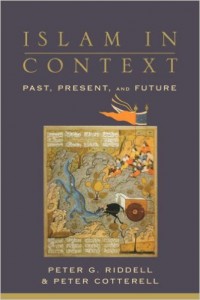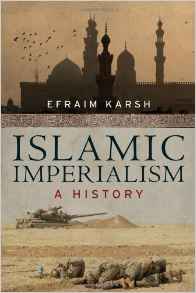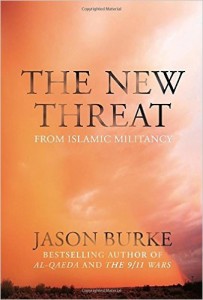It is particularly painful for a Muslim to hear Muhammad traduced, so I must apologise at once for any offence caused by asking this question.However, many evangelical Christians – some of whom should know better – are not only asking but insisting that the answer is “yes”. To be precise, their specific claim is that Muhammad would lead ISIS because it is quintessentially Islamic.

This is an odd position for a non-Muslim to take. Christians believe that there is an orthodox, true form of the Christian church – a quintessence of Christianity – because we believe that God has some strong opinions on the matter. The Church should conform to his will. However, if Muhammad was not God’s final messenger there is no quintessence of Islam. If Muhammad did not teach the way, the truth and the life, if the Koran is not God’s word, then there is no central message to discover. There is only a set of human responses to a set of human traditions. There is no more one true way of being a Muslim than there is one way of being a conservative or liberal.
Of course, there are some themes which unite all Muslims: a strong commitment to monotheism, a belief that Muhammad is God’s final messenger, and that the Koran is the supreme revelation from God. However, a liberal reformist, a Sufi Pir, and an Islamist radical will interpret the Koran in very different ways. Islam simply does not prescribe one form of government or one form of political engagement. Islamic communities evolve and change; they can continually renegotiate their relationship with the state.
 Perhaps the question implies that the historical Muhammad would have approved of ISIS. How one could come to that conclusion from the historical sources is a little perplexing. ISIS has a particular vision for its Caliphate and reserves its worst venom for Shia Muslims. Now, both the Caliphate and the split between Sunni and Shia post-date Muhammad’s death. And both the schism and the evolution of the Caliphate occurred because Muhammad left no explicit instructions for choosing his successor.
Perhaps the question implies that the historical Muhammad would have approved of ISIS. How one could come to that conclusion from the historical sources is a little perplexing. ISIS has a particular vision for its Caliphate and reserves its worst venom for Shia Muslims. Now, both the Caliphate and the split between Sunni and Shia post-date Muhammad’s death. And both the schism and the evolution of the Caliphate occurred because Muhammad left no explicit instructions for choosing his successor.
 Would Muhammad endorse IS’s tactics? The Koran is our best source of historical information about Muhammad and, to be sure, contains passages which call for ruthless violence against unbelievers. However, such passages are meaningless outside their literary and historical context. We know that Muhammad was involved in a long war with pagan rulers of the city of Mecca. He also made and honoured treaties with non-Muslim tribes: the first Muslims did not visit death, rape and destruction on every non-believer who crossed their path. So, originally, most of these texts are probably aimed at his enemies in the city of Mecca. They probably contain a fair degree of hyperbole given that Muhammad did not lead a slaughter when finally defeated the Meccans.
Would Muhammad endorse IS’s tactics? The Koran is our best source of historical information about Muhammad and, to be sure, contains passages which call for ruthless violence against unbelievers. However, such passages are meaningless outside their literary and historical context. We know that Muhammad was involved in a long war with pagan rulers of the city of Mecca. He also made and honoured treaties with non-Muslim tribes: the first Muslims did not visit death, rape and destruction on every non-believer who crossed their path. So, originally, most of these texts are probably aimed at his enemies in the city of Mecca. They probably contain a fair degree of hyperbole given that Muhammad did not lead a slaughter when finally defeated the Meccans.
But didn’t Muhammad order the slaughter of the men of the Banu Qurayza – the Jewish tribe who supported his enemies at Mecca? Ibn Ishaq claims that Muhammad led a siege against the tribe, but a leader named Sa’d decided that the men (800 to 900 in number) were to be executed. The gap in time between Muhammad’s life and Ishaq’s record is so great that we simply do not know what led to the massacre. But, while what we can reasonably infer about the historical Muhammad is limited, he was certainly a shrewd politician and clever military commander. He would be unlikely to bet on ISIS’s attempt to achieve superpower status through propaganda, guerilla warfare and terrorism.
What about other Islamic sources? There is a considerable gap in time between Muhammad and the Sira (biographies of Muhammad) and the Hadith (collections of short reports about Muhammad). There may be much material within both to justify ruthlessness in war – but this tells us more about Islamic attitudes during a period of imperial expansion than it does about Muhammad himself. In fact, a careful look at the behaviour of the Arab tribes during their conquest of Persian and Byzantine territory suggests that they did not interpret these texts as a licence for genocidal, conversion-centric slaughter or totalitarian rule.
 Conversion to Islam was actually discouraged in the early Islamic empire, which was run by Arabs primarily for Arabs.The Caliph Umar even accepted the Arab Banu Taghlib tribe into his army, on a similar tax basis to Muslims, though it refused to abandon its Christian identity. And non-Arab Monophysites in the Byzantine empire welcomed the Muslims as liberators, and even fought for them in the Battle of the Masts. The Arab armies gave Iranians better protection from raiders than their old Sassanid rulers. It is generally acknowledged that Jews got a better deal under Muslims than they did from Christians in Western Europe.
Conversion to Islam was actually discouraged in the early Islamic empire, which was run by Arabs primarily for Arabs.The Caliph Umar even accepted the Arab Banu Taghlib tribe into his army, on a similar tax basis to Muslims, though it refused to abandon its Christian identity. And non-Arab Monophysites in the Byzantine empire welcomed the Muslims as liberators, and even fought for them in the Battle of the Masts. The Arab armies gave Iranians better protection from raiders than their old Sassanid rulers. It is generally acknowledged that Jews got a better deal under Muslims than they did from Christians in Western Europe.
Unlike Christians, who are meant to live in the world as exiles and sojourners, the early Muslims were engaged in the project of creating a civilization. Every political authority will need to assert the right to use violence on those who threaten it from without and within. So it is not surprising that so many early Islamic texts sound so warlike: a state which renounces violence is impotent. These texts do not only talk about violence, but the need for law, justice, trade and honour. ISIS depends on bloodshed because it struggles to deliver anything else.
ISIS lacks the skill and expertise to build a civilization. It inspires fear, as rabies inspires fear; but it cannot generate respect. It cannot build a modern health service, never-mind an empire. So, whatever we think of the founders of Islam, there is no reason to think they would look at ISIS with anything more than utter contempt.
